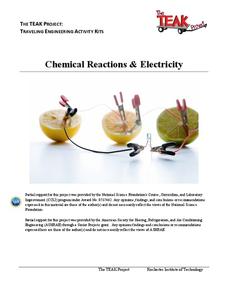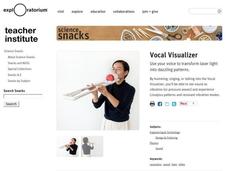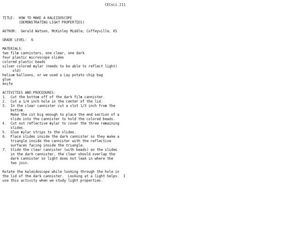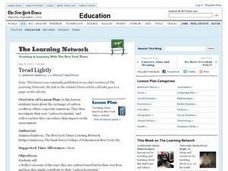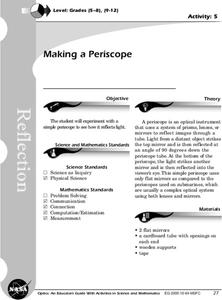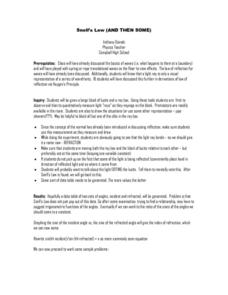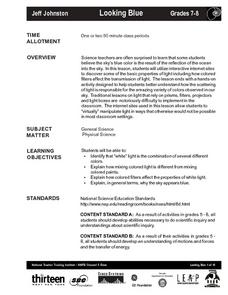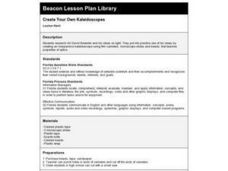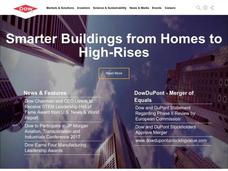Rochester Institute of Technology
Chemical Reactions and Electricity
After a discussion of chemical reactions and electricity, scholars break into groups and follow a scripted activity to discover if fruit can power a clock. After a concluding discussion, the class a presented with a challenge.
Chicago Botanic Garden
Micro-GEEBITT Climate Activity
A truly hands-on and inquiry based learning activity bridges all the lessons in the series together. Beginning with a discussion on average global temperatures, young meteorologists use real-world data to analyze climate trends in order...
Science 4 Inquiry
Phases of the Moon
The moon takes just over 27 days to orbit around Earth. Young scientists position themselves as the earth as they rotate around the sun and hold the moon. This allows them to observe the patterns and phases of the moon.
National Nanotechnology Infrastructure Network
Making a Liquid Crystal Thermometer
Introduce your classes to a fourth state of matter! Liquid crystals have a colorful sheen that changes based on different physical factors. Learners use this information to create a liquid crystal thermometer where the color of the...
Exploratorium
Vocal Visualizer
Make sound visible with an activity that provides directions for how to build a vocal visualizer meant to create light patterns. Making noise into the visualizer causes a mirror to vibrate, reflecting a laser beam, and creating the...
Curated OER
Inventions- The Impact
Students investigate inventions and the impact they can have on people. In this technology lesson, students research Thomas Edison and discuss how the invention of the light bulb impacted others. Students sketch out an invention they...
Curated OER
Colors, Colors Everywhere
Students mix red, yellow, and blue frosting together to produce secondary colors. Pupils are shown that all colors are made from mixing primary colors of paint together. They discuss the color wheel and spread the "paint" icing on...
Curated OER
Mondrian - Primary/Secondary Color Study
Utilizing computer software, learners demonstrate the color spectrum. They investigate the life of the artist Piet Mondrian and define his style of artwork. Then they use Photoshop to recreate some of his designs while discovering the...
EngageNY
TASC Transition Curriculum: Workshop 8
Lights, camera, action! Math educators consider how to improve their instruction by examining a model of the five-practice problem-solving model involving a movie theater. Participants examine cognitive demand in relation to problem...
Curated OER
Lenses and Mirrors
Students investigate lenses and mirrors showing how they bend and reflect light waves.
Curated OER
How to Make a Kaleidoscope
Sixth graders create a kaleidoscope. In this light refraction lesson, 6th graders create a kaleidoscope to investigate the properties of light.
Curated OER
Tread Lightly
Young scholars investigate the use of carbon fuels and how they effect the environment. They conduct research using a variety of resources. The information is used from the reading to calculate one's personal influence upon the environment.
Curated OER
Making a Periscope
Students experiment with a simple periscope to see how it reflects light. They draw a diagram of the path a ray of light follows as it travels from an object, through the periscope, and into your eye.
Curated OER
Spectral Surprise
Students create spectral colors. In this hands-on science lesson, students examine the electromagnetic spectrum as they follow steps to create a model that separates and displays light.
Curated OER
How We See Things
Students explain that when a beam of light is reflected from its surface, it changes direction. In this virtual science experiment lesson plan, students complete an activity that requires them to investigate how flat mirrors reflect...
Curated OER
Snell's Law (And Then Some)
Students conduct an experiment to test Snell's Law using a block of lucite and a ray box. They measure the light rays as they impinge upon the block. Students are also asked to draw the situation of the lab or create a model of the...
Curated OER
Gel-O-Colors!!
What distinguishes the differences between refraction and reflection? Learners identify the properties of light as they mix colored light to create new color variations. As they work they gather data about the properties of light and...
Curated OER
Invisible Rays
Students explore physical science by completing a lab assignment. In this sunlight activity, students define a list of scientific vocabulary terms and complete fill in the blank questions. Students conduct a photographic experiment in...
Curated OER
Photosynthetically Available Radiation (PAR) Measurements
Students calculate the amount of solar radiation hitting the ground at their school compared to the solar constant. They also repeat the experiment at a water testing site and utilize a light probe to measure the light being reflected...
Curated OER
What Color is Chlorophyll?
Students observe the interactions of chlorophyll and light. They develop and form their own testable hypotheses. Students predict the color of chlorophyll in various types of plants.
Curated OER
Looking Blue
Students participate in a research project that is exclusively using the internet. The author states that traditional labs are hard to conduct for a light lab. This one uses the internet with the intention that students can manipulate...
Curated OER
Create Your Own Kaleidoscopes
Seventh graders create a kaleidoscopes after researching Sir David Brewster and his ideas on light. They recognize the properties of optics from making and using the kaleidoscopes.
Curated OER
The Earth's Energy Budget
High schoolers study the Earth's energy budget. In this investigative lesson students observe a lab that shows all aspects of heat transfer and light processes.
Curated OER
Fiber Optics
Students explore the uses of optical fibers, are exposed to the principles of refraction and total internal reflection, solve problems relating to the design of fiber optic cables, and compare them to copper transmission lines.


